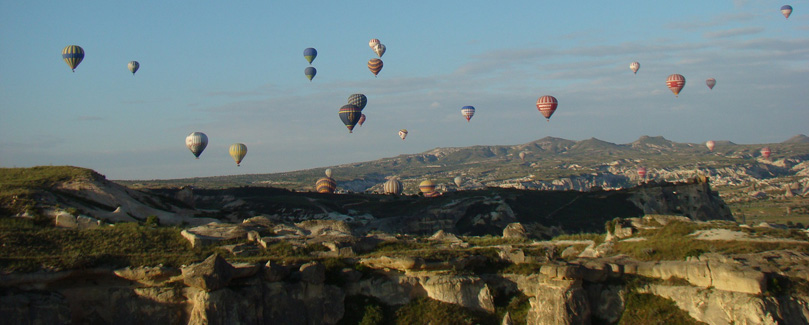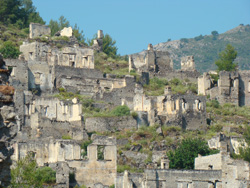
|
|
Ruined Greek village
on Turquoise Coast |
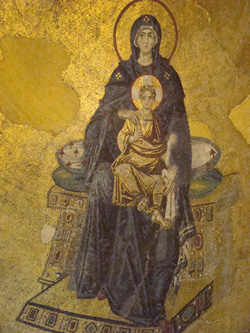
|
|
Aya Sofia mosaic |
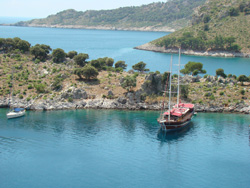
|
|
Gulet in Turquoise Coast cove |
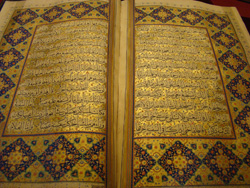
|
|
Ancient Koran |
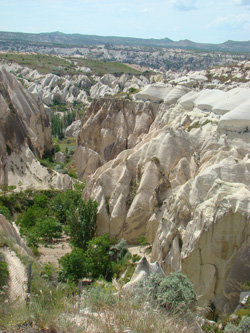
|
|
Rose Valley hike |
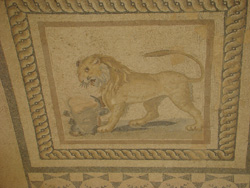
|
|
Mosaic in Ephesus villa |
Ernst & Young, Istanbul
We met with three Turkish partners who told us that Turkey is a unique combination of West and East and doesn't fit neatly into either sphere. It is the 15th largest economy in the world and wants to be in the top ten by 2023 (their centennial).
The government is very conservative, but not really Islamic. The partners are less concerned about Islamic influence than they were when the government came to power eight years ago (it has just been re-elected).
Turkey's focus on joining the E.U. has helped the economy develop, even though Turkey may never become part of the E.U. The process is very important as many Turks consider themselves more European than Middle Eastern. The process is helping to make Turkey a more open, democratic society. The E.U. doesn't want a large Muslim country in its midst, so Turkey is focusing now on the process.
Turkey has 70 million people, with 60% under age 35 and 43% under age 25. It is diverse ethnically and politically and ranges from conservative to secular in religious beliefs.
Unemployment is 11%, but much higher for young people. The economy must grow to accommodate the youth. The internet is showing young people how others live, so they want the same things.
Private equity firms are coming into Turkey now. The consumer sector, real estate, mining and health care are leading growth areas. Europeans are the primary investors, with Germany being the main trading partner, followed by France and the U.K. China is a growing partner as well. They would like more American companies. Ford is the biggest U.S. manufacturer in Turkey. Coca-Cola is also here.
Turkey is a major logistics base for the Middle East and Asia. They have export agreements with the E.U. so they don't pay tariffs into the Union. It is also a big auto assembly and manufacturing location. Turkish companies are big parts suppliers to automakers. Cars and parts are Turkey's largest export sector. There are high taxes on all consumer products because Turkey wants to control its balance of trade.
The government is working on economic development throughout the country. It is still not a developed country. Per capita GDP is about $10,000 U.S. and the government is aiming higher than that. Istanbul's per capita GDP is $25,000 U.S. in the heart of the city, but closer to $5,000 on the edges. Turkey suffered an economic contraction of 4% in 2009, but grew 9% in 2010. Inflation has been brought under control by this government.
The banking sector has changed hands in Turkey, starting in 2000 with mergers and acquisitions. The M & A process now includes insurance companies. There are only a few fully-owned Turkish banks now. Turkey has been less impacted by the global banking crisis because of its strong banking laws and fundamentals.
Turkey is known as a nation of small shopkeepers, which is evident everywhere. It is an entrepreneurial country. The government heavily supports R & D in the universities, but to reach the global level, they need to find something unique.
After 2002, foreign affairs changed dramatically. The government wants to influence the entire region of the Ottoman Empire and beyond, so Turkey is working to be a central player economically and politically in the Middle East, North Africa, Central Asia and Eastern Europe. The government is trying to play a leadership role now and is developing significant relationships with African, Asian and Middle Eastern countries. They want to play the role of mediator in regional and global disputes. Consequently, the Foreign Minister travels throughout the region. All this helps the economy and export growth.
In Libya, Turkey tried to act as mediator between the government and rebels and between the government and NATO. Turkey is conflicted over its NATO role in Libya. Their hope was to have Gaddafi leave peacefully, but Gaddafi no longer believes Turkey can help him.
Most higher education institutions are government-owned and are inexpensive. There is a two-stage national exam for admission. The percentage who pass is very low even though students study for years for their exams. Turkey needs to improve its education throughout—it's a subject of constant complaints. The type of instruction needs to be changed.
Pfizer Turkey
We met with Tuncay Teksoz, Pfizer Turkey's Health Policy Coordinator and former President of Turkey's Social Security Agency.
Pfizer has been in Turkey for 52 years and produces in Turkey 83% of the products it sells here. It exports 11% of the products it manufactures here. Turkey is the hub for ten countries in the region.
Turkey is part of both East and West, a member of NATO since 1952, a founding member of the OECD and in the process of securing EU membership. It is an energy hub from Asia to the West and a natural leader of former Soviet Turkish countries. It maintains strong connections with the Gulf countries.
The labor force numbers 45 million. There are 10 million students in primary schools. The government is establishing more universities, but there are not enough trained faculty to staff them.
Turkey has reduced its inflation rate from 40% to 6% over the last decade. The medium-term economic development plan replaced the IMF loan agreement. Before this plan, Turkey had used IMF funding nineteen times from the 1970's to 2000's. GDP growth is projected to stay above 5% and foreign direct investment is expected to grow 300% over the next five years. Unemployment is growing, but the labor force participation rate is low because most women don't work (70% of men work, but only 30% of women). Women's participation in non-agricultural jobs started to grow in 2007.
The working age population is growing at a faster rate than old people, a significant factor for the social security system. Right now, there is a 7:1 ratio of working to retired people. The savings rate is too low to generate enough jobs and needs to be above 15%. Turkey needs foreign direct investment.
Health care reform began in 1996 and was implemented in 2005, intending to cover the entire population. Before, there were five health care insurance funds, all with financial problems. Turkey now has universal health insurance, which makes the system sustainable. There are also many private hospitals. The universal insurance system is fully implemented, provides broad coverage and is "pay as you go." Turkey is getting healthier. The financing of health care is better and costs are down. Turkey's health care costs are 6% of GDP compared to 9% in the OECD. There is a need for more hospital beds, though, as Turkey only has 2.3 beds/1,000 people while the OECD has 5.6 beds/1,000 people. They also need more doctors (1.5/1,000 compared to OECD's 3.2/1,000).
Health care reform has meant a big increase in patient visits, with exams per physician per year tripling between 2002 and 2008. There are quality concerns, but efficiency is up. Patients are more satisfied because they have better access. There are co-pays on drugs, no payment for health care insurance and low co-pays for doctor visits. Previously, there was no primary care. Now, you can go directly to a specialist, but they want to move to mandatory primary care first. Having a young population helps keep health costs down.
There is a shortage of doctors, which brings a resistance to private hospitals (which take doctors out of the public system). There are many new medical schools, with 5,000 new doctors graduating each year now. But, Turkey will need 8000 new doctors per year over the next five years. They are also recruiting foreign doctors.
Public health care expenditures are about 3.5% of GDP. The government imposed restrictions on drug expenditures, which are now 1.4% of GDP. But, the sales are increasing because of the lower price. Before the reforms, large numbers of Turks had no access or inadequate access to health care. Under the separate health care systems, patients had to go to their insurance system's hospitals, pharmacies and doctors. They had to get the cheapest care, including generic drugs. Pfizer couldn't exist in this market. Hospital pharmacies closed and were transferred to the Ministry of Health. Patients can now go to private pharmacies.
The new health care system uses reference pricing, pegged to exchange rate fluctuations. It caps total government health care spending. If they are nearing the cap, the government will cut the reimbursement levels.
Generics are now 40% of the market. The government pays 15% above the price of generics for drugs. Under the new law, malpractice is a big issue. The government requires that 2.5% of doctors' salaries go to malpractice insurance.
The birth rate is growing at the same time the economy is shifting from agricultural to industrial, requiring more jobs. Initially, women were excluded from industrial jobs, but this is now opening up. Education level equates to work participation level among women. Less educated women rarely work. The minimum wage is low, so women in minimum wage jobs can't afford child care.
Social security is 35% of gross salary; 12% of that, for health care. Workers pay, but families don't pay extra for family health coverage. Employers pay for employees, with a ceiling of $3,000 U.S. per year. Pfizer has 1,400 employees in Turkey and can offer private health care insurance as a supplement to the public system. Private insurance is only 1.5% of the total coverage.
Retirement payments are capped at seven times the minimum wage. Retirees get 60% of their salaries in retirement—in real terms, that amounts to about 80% up to a ceiling of about $1,800 U.S. per month. The average retirement is $1,500 U.S. per month.
U.S. Consulate, Istanbul—Greg Taevs, Principal Commercial Officer
Greg is a very experienced Foreign Service Officer, who is just moving to Japan. He gave us an excellent briefing on the U.S. view of Turkey's economy.
Trade between the U.S. and Turkey is $15 billion annually, which is very small. In contrast, our trade with Mexico, about the same size as Turkey, is $365 billion. Turkey signed a customs agreement with the E.U. in 1996 which gave both sides most of what they wanted. Turkey is "made in Mexico" for Europe. If Turkey joined the E.U., it would displace France to the number three position and, by virtue of its size, have a big impact on the E.U. since clout in Brussels is based on population. It would be a big advantage to Europe because of its large market size and labor force.
The corporate tax rate is 20%, but 40% of the Turkish economy is "gray." There are few medium-sized businesses. Companies that employ more than fifty people pay a higher tax rate and have more regulations on hiring and firing. There are no incentives to grow, so most companies don't. U.S. companies here end up subsidizing the "gray" economy because they pay taxes.
Gas is $12 U.S. per gallon. That is one way the government can make up for all the taxes people and businesses don't pay because they can fully account for the gasoline sales. There is a VAT of 18% on most items and 8% on food and lodging.
With health care reform, large pharma is looking for a central buyer—the government system. There is also a private health care system they can sell to. The government tries to beat everyone down on price, taking the prices from other countries and giving pharma companies the lowest price.
"Good manufacturing certification" is required in Turkey. New regulations were promulgated in 2010 that require a company to get a good manufacturing certificate in Turkey, which is very expensive. You can't import until you get a certificate, but there is no system in place to grant that certificate, which is required for every manufacturer regardless of where in the world their plants are located, meaning even manufacturing plants overseas must have Turkish certification to export to Turkey. It is a perfect trade barrier. There was no consultation with business before this regulation was established. It was top down, immediate, with no regulatory structure. This has held up imports for over a year and Turkey likes it that way. It applies to E.U. imports also. But, it doesn't cover generic drugs or companies with plants in Turkey. This is a big factor in the low trade level between the U.S. and Turkey.
Izmir has a free trade zone. Cummins has plants providing filtration systems and ignition parts there. They received good incentives to locate there. Pratt & Whitney manufactures aircraft engine parts and F-35 parts there. Choices for locating manufacturing plants in this part of the world are Eastern Europe, Dubai, the UAE or Turkey. Turkey has good ports, land availability, connectivity to Europe and the Middle East, customs agreements with the E.U, and regional reach. It is pretty Western-oriented in terms of business. Turkey is conservative, but very business-oriented.
The Sea of Marmara is a trade center. Turkey is trying to develop its southeast region. Tourism is a huge industry which Turkey wants to build even more, particularly from Russia, the U.S. and Japan.
The government wants to be one of the top ten world economies by 2023, but won't make it by then. They want a turnkey Silicon Valley, but must lighten up on their regulations a lot to achieve that. They are impatient and don't want to do the groundwork necessary to get where they want to go. They are just beginning to figure this out.
Higher education is limited and exclusive. A student must have after-school tutoring to get into a university. The U.S. benefits from this because 14,000 Turks go to the U.S. for higher education each year. It is a major U.S. export to Turkey and creates important ties for the future. Student visas are a priority for the consulate. The families pay the tuition. Lots of U.S. schools recruit in Turkey. The culture prizes education.
Turkey was founded in a world that was against them and had to fight to create itself as a nation. Now, it has a Higher Learning Board which exerts tight control over what can be taught and how. For example, Greg's daughter is in the International School, but is not allowed to learn Turkish there. The Higher Learning Board requires that, to teach Turkish, you must teach other parts of the Turkish curriculum.
Turkey is 99% Muslim with varying degrees of "Muslimness." Mosques are everywhere. The government keeps them on a short leash, controlling what they can say and teach. They don't want foreign Muslim influences, so they tightly control radicalism. There is no outward display of religion in the government, but outside government, it is a different issue. This has raised the head scarf debate. The government (and military) hasn't wanted public displays of any religion in government-supported places, like universities. Women can't wear a headscarf in a government office. The Turkish staff in the Consulate is very secular.
Girls are not discouraged from education and work. Women's issues may be getting more important. Right now, there are eight years of required education. In Central and Western Turkey, this is adhered to, but less so in the Southeast.
The current government is more conservative than its predecessors and is business-friendly. It has privatized industries and pushed for E.U. membership. Turkey is a Mediterranean country with a better economy than many others. The new commercial code increases transparency and is patterned on the German system. It makes the gray economy difficult. Now you need to have one set of books instead of one for taxes and one for the business. The gray economy doesn't fly with companies wanting to do business here.
There are no term limits for the Prime Minister. Erdogan, the current Prime Minister, may want to become President.
Turkey currently has no independent sources of energy, though it does have a little bit of coal. Exxon is exploring in the Black Sea. Turkey is a natural energy corridor and has lots of processing on both the South and West coasts. Russia is its biggest trading partner, primarily in natural gas. There is now a pipeline from Azerbaijan. Energy transport is a big deal to U.S. companies.
Turkey is considering a canal to the west of Istanbul, parallel to the Bosporus, to carry hazardous materials between the Mediterranean and Black Seas. The Bosporus is an international waterway, part of the agreement Ataturk negotiated on Turkish independence in 1923. Turkey can control some aspects of its use, such as permitting shipping to go only one way at a time. But a new canal would be entirely under its control.
The military was the watchdog of secularism, as required by the constitution. The military sees this as a natural role, but it's not compatible with a modern country. The AKP, the ruling Islamist party, has tried to roll it back. A case to shut down the AKP a couple of years ago failed in the courts. The AKP is making the military more like Europe, with a scaled-down role.
There have been military purges recently. The "deep state" theory fancies a conspiracy surrounding a military coup and may have some grounding in reality. There was a group of generals determined to maintain secularism. The AKP arrested a bunch of high-up military officers, journalists and others, but is still trying to put a conspiracy case against them together. The people are still in jail, however, with no charges and no trials. This has eroded military power, which was the unstated goal of the purge. Secularists see this as an AKP plot to implement Islamic law. But, the days of military coups are probably over. The West, meanwhile, is very critical of the muzzling and detentions of the press.
The Prime Minister now has the ability to pack the courts. He is an authoritarian figure. Turkish society is authoritarian. This provides the potential for a dictatorship. Erdogan has kept himself in check, but many fear his authoritarian bent. Things happen if he says so, even regarding low level issues.
Corruption is a problem, but Turkey never gets above the middle in global corruption indexes. Business gets done by whom you know. Relationships are very important. This works well in many countries, but not in the U.S. Turks haven't figured out our system. They try to see who's influential rather than learning our system.
Turkey was hurt badly by Libya. It had to evacuate 25,000 Turks. Turkey did a lot of business there that may not start up again. Turkey is all over the Middle East, so right now, much of their business is on hold as the politics get sorted out. Syria is very worrying. There is an increasing refugee problem.
Back to top
<<Travelogue

|

